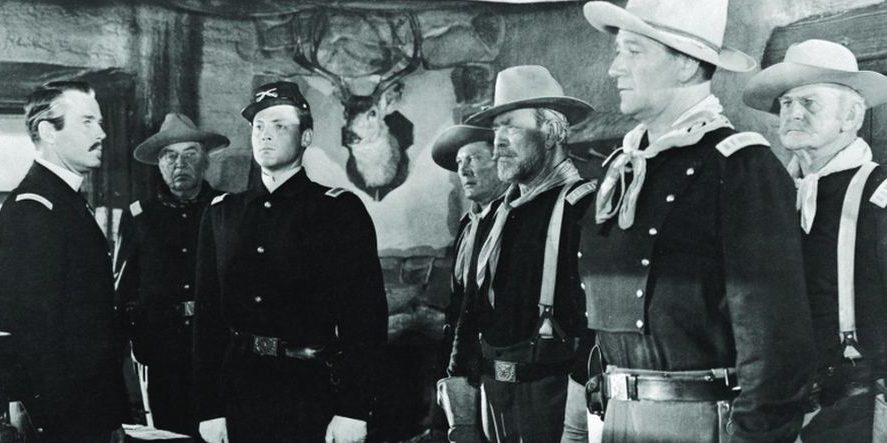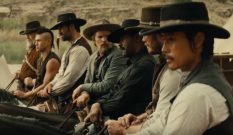We need a constitution that will bend to populist winds so that it will not break.
The Democratic Virtues of Fort Apache
Fort Apache comprises the first in John Ford’s “Cavalry Trilogy.” Along with She Wore a Yellow Ribbon and Rio Grande, the film focuses on the U.S. Cavalry in the American West. Not simply one of Ford’s greatest Westerns, it stands as one of the best films ever made.
It also presents a coherent and sustained political teaching. This teaching speaks to a contemporary debate, one initiated by a group of scholars and writers who understand themselves as Post-Liberals. Among their most famous articulators are Notre Dame’s Patrick Deneen and Harvard’s Adrian Vermeule. These men, and like-minded persons, divide the world into ancient and modern times. They see a vast distinction between ancient and modern men, with the latter sorely lacking in virtue, especially virtue of the aristocratic sort. America itself seems severely—if not hopelessly—flawed due to its more democratic modernity. Fords’ film asks us to consider how ancient and modern virtues (as well as vices) and how the aristocratic and democratic souls operate in America in particular and the West in general.
The film opens with an old stagecoach racing across Monument Valley, the western space made iconic by Ford. The coach contains Lieutenant Colonel Owen Thursday and his teenage daughter, played by Henry Fonda and Shirley Temple. He has taken command of Fort Apache, a lonely outpost with its own community in the form of a cavalry regiment as well as the families attached to it.
Thursday exemplifies both an aristocratic and ancient spirit. Aristocratic in that he sees the world in hierarchical terms. Rank, with its barriers and distinct sets of rules, seems at least just, perhaps even natural for the officer. All men do not seem created equal. The military certainly does not keep them so. And as an ancient soul, Thursday thirsts for glory and all its attendant honors. He recognizes the battlefield as the greatest context for displaying the virtues that will attain this glory and honor—namely courage and wisdom.
Yet at the beginning of the film, Thursday exudes anger and frustration. His pride has been wounded. Every bumpy moment of the stagecoach trip reminds him of that wound. Accomplished in the American Civil War, Thursday feels slighted, dishonored by the assignment to command the regiment at Fort Apache. The Fort is remotely located and little known. It presents a far cry from the time Thursday mentions he spent in Europe, from the Eastern elites whose acceptance he desires, or the newspapers whose praise he covets.
Arriving there, Thursday encounters a community with a distinctly different ethos. The regiment, while not ignoring honor or rank, has a perspective decidedly functional and democratic. It feels as much like an extended family as it does a military unit. They hold regular dances and other social events. They dress functionally for the desert conditions and their appointed tasks around and outside the fort. They show respect for the chain of command but interact casually with each other across the ranks. Moreover, the men at Fort Apache seem uninterested in glory the way Thursday understands it. Rather, they wish to live in peace to the extent this is possible.
The absence of Thursday’s longings does not mean the regiment possesses self-centered cowards. Instead, the soldiers exude a dignity found in doing their work well, contented with the ensuing results. They seem to have internalized the advice of Solomon in Ecclesiastes, to find contentment in the regular allotments of life—family, work, and food. Their women, moreover, provide an oasis of culture and a backbone to the moral compass of the outpost. They are the epitome of Western female virtue—strong as steel in the most feminine of ways.
Tensions ensue between the new commander and his new command. Thursday enforces a much higher level of discipline on the men and the officers, including stricter rules for level of dress (he at one point upbraids his officers on their uniforms, saying, “We’re not cowboys at this post—or freighters with a load of alfalfa.” He demands stricter adherence to military law, especially in the class distinctions it creates between officers and non-commissioned soldiers. This point takes on a personal element, as Thursday’s daughter falls in love with a young officer whose father, unfortunately, is a mere sergeant-major in the regiment.
Here the conventional robs the natural of its right. The father, though only a sergeant-major, is the picture of the good man and the good soldier. We find out that he served with the Irish Brigade in the Civil War and received the Congressional Medal of Honor, making him Thursday’s equal—really, his superior—in virtue. Only holding on tenaciously to what amounts to an arbitrary class distinction allows Thursday’s hubris to deny any legitimacy to the potential union.
The action driving the plot centers upon the American Indian leader, Cochise, who has left the American reservation with his Apache tribe and now threatens the peace and safety of the entire area. This point, too, elicits tension between Thursday and his command. Captain Kirby York, played by John Wayne, knows the American Indians well.
Showing a democratic spirit, Captain York respects them as equals. This equality extends to the Apaches as human beings and as soldiers. He sees justice in their leaving the reservation. The reservation was run by a scoundrel, a government agent named Silas Meacham. However harshly one assesses Owen Thursday’s vices, they pale in comparison to the evil found in this man. He has no moral compass except the desire to make a profit. He sees the American Indians as mere savages, children in intellect and will and thus hopeless and helpless. Meacham thus sells weapons and whiskey to the Apaches while on the reservation. Predictably, the young men become drunkards, dissipated, and violent at the same time. The Apaches leave the reservation in an act of desperation. Ironically, their placement on the reservation was meant to civilize them. Instead, they lose their virtues. They must leave to try to regain what they lost at the hands of Meacham and the “civilizing” American government.
The virtue of courage and living by high-minded ideals are not relics of a nobler past. If anything, this film shows that ancient souls possess their own vices that endanger and demean.
Thursday holds no such respect. He does see the corruption in Meacham. While frustrated by his regiment’s democratic and functional tendencies, he finds Meacham’s corruption downright contemptuous. But Thursday shares something of Meacham’s assessment of Cochise and of American Indians in general. They are not his equals as a human, a white American, or a soldier. His aristocratic spirit goes from the personal to the civilizational, if not racial. When Thursday finally meets Cochise, he will call him a being “without honor.” To him, American Indians are worthy of contempt as a people, not to be compared with Western humanity or military prowess.
To be fair, Thursday does possess some admirable qualities. He genuinely loves his daughter, even if his own ambitions often get in the way of showing her proper affection and looking out for her best interests. His demands for proper dress and attention to etiquette are far from wrong for a military unit. Even on the battlefield, Thursday’s first military move succeeds in bating a group of American Indians into a trap, springing it on them with a picturesque cavalry charge.
The men of Fort Apache, moreover, are no angels. Several of the sergeants succumb to Meacham’s whiskey at the moment they were tasked with destroying it. They are capable of debauchery every bit as low as the American Indians. We eventually hear that, indeed, Thursday’s particular implementation of discipline had improved the regiment.
The tensions come to a head, however, when Thursday lures the Apaches back into the area, then wages a military campaign to forcibly subdue them and return them to the reservation. In a culminating moment of arrogant folly, Thursday orders the full regiment to charge headlong into a valley, thinking he will overrun the Apaches as they move across the desert. Captain Kirby calls the move suicide, saying the Apaches are tricking Thursday into a disastrous attack on a fortified area.
This objection, one in a long line during the campaign, angers Thursday enough to relieve Kirby of his command and to promise a court-martial for him after the military engagement ends. Here the aristocratic element comes out in full force. Thursday simply can’t imagine that Cochise could operate on a level of military cunning and skill that Kirby attributes to him.
Instead, Kirby proves sadly correct. The Apaches did spring a trap. The regiment charges bravely. But it is obliterated: first by Apache sharpshooters entrenched in the hills overlooking the valley, and second by the tribe’s own charge to finish off what remains of the men. Thursday refuses to leave the battle. He chooses to stay and die with his men even when no chance remains. Some may read this move as an act of cowardice, not wishing to face the opprobrium sure to come when Thursday’s actions receive an assessment from the Eastern military elites from whom he sought vindication. Yet, one also can read it as a point of honor. He cannot attain glory now for his wisdom, but he can face the results of his decisions in the same way as the men he led to the slaughter. As an old aristocrat, Thursday does feel honor-bound to accept responsibility for his actions, however deadly the cost.
The film ends with a strange twist. Kirby, unsurprisingly, now leads the regiment. They continue to chase Cochise. But we find out that Owen Thursday now is a hero. The story of the regiment’s charge has become the stuff of legend, not a tale of foolish hubris. Kirby seems to have reported the events of the previous campaign in a manner that cast Thursday and the regiment in this light. This is not the last time Ford will make this move of having a legend overtake the genuine facts. The more famous instance comes later, in The Man Who Shot Liberty Valence, where, upon having a long-standing myth busted, the newspaperman in the film says, “When the legend becomes fact, print the legend.”
Why would Kirby create this legend? Why would he lie about Thursday and the campaign? It cannot be the love he held for the man. It cannot be respect, either, given the list of mistakes Thursday made and the vices that led to them. Instead, it seems Kirby did it for the men slaughtered. Remember that Kirby and the men’s democratic tendencies did not seek glory as Thursday saw it. Thursday sought glory for himself. But these soldiers did hold to an ennobling dignity, a collective one that attached to their vocation as soldiers in the United States Cavalry. Kirby does not want them remembered as lives wasted by foolishness. He wants them remembered, equally, as fine soldiers who did their duty well.
Kirby ends with a paean to the cavalryman that seems to support this reading. He says that the dead:
. . . keep on living as long as the regiment lives. The pay is thirteen dollars a month; their diet: beans and hay. Maybe horsemeat before this campaign is over. Fight over cards or rotgut whiskey, but share the last drop in their canteens. The faces may change . . . the names . . . but they’re there: they’re the regiment . . . the regular army . . . now and fifty years from now.
In this tale, we can renew our great respect for the soldiers who tamed the West. But we can learn more still.
Fort Apache shows that the ancient and modern, the aristocratic and democratic tendencies continue in every period of history, including our own, with the film illuminating the virtues and vices that accompany each. In the end, the film sides with the quiet, sure, sturdy dignity of modern democratic man.
In taking this side, it also shows that the gap between the two kinds of men might be less than Post-Liberals assure us. The virtue of courage and living by high-minded ideals are not relics of a nobler past. If anything, this film shows that ancient souls possess their own vices that endanger and demean. The film then shows contemporary virtues that stand up to the ancient ones. Modern, democratic man is capable of great feats of bravery. His courage does stem from a desire for honor, one committed to excellence and grounded in a common dignity. Thus, may we eschew the ancient, aristocratic vices of Owen Thursday. But may we also see the full honor, even glory, in the men who lived and died in Fort Apache.



